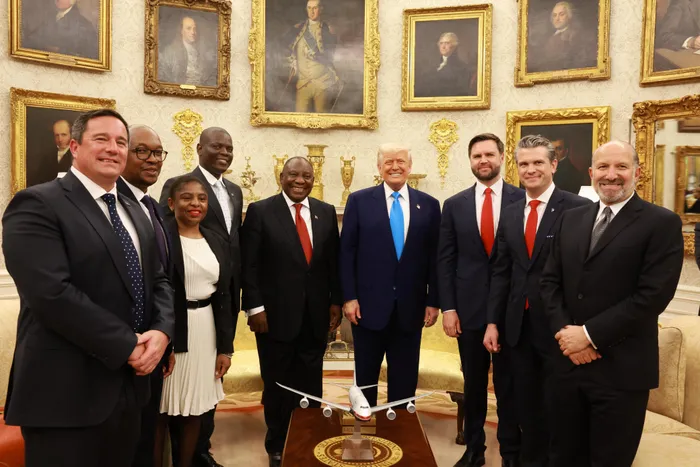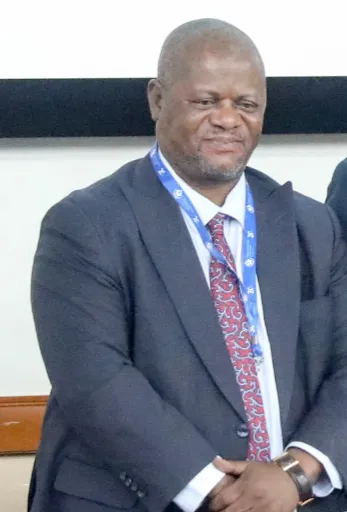Lobolo at the White House: President Ramaphosa, the Chief Negotiator, Delivers the Bride

South African President Cyril Ramaphosa with his cabinet ministers meeting US President Donald Trump and his senators
Image: GCIS
Wednesday's official visit to the White House had all the hallmarks of a high-stakes lobolo negotiation. President Cyril Ramaphosa, standing tall as the head of delegation, was not just there for pomp and ceremony.
He had a mission: to return home having secured the goodwill, support and symbolic bride, the rational sensibilities of the current occupant of the Oval Office and what he represents, and the economic weight and global influence of the United States.
Like any respected head of the lobolo delegation, the visiting head of state must navigate foreign terrain with discipline, charm and precision. Diplomacy has its own sacred code, a blend of cultural intelligence and political acumen. To succeed in such negotiations, there are five key protocols every leader must observe:
Polite and respectful communication:
Speak when spoken to, be polite and courteous at all times and resist the temptation to argue. Diplomacy is not a shouting match. It is an art of restraint and timing. Ramaphosa exemplified this last night, holding his posture and never rising to provocation, even as the tone around him shifted. Anything contrary, and you return home empty-handed, as the father and uncles of the bride brand you rude and disrespectful. Remember Zelenskyy?
Respect for hierarchy and titles:
One must never forget the formal order. Addressing the host with their correct title and observing ceremonial protocol is not optional. It is foundational. Ramaphosa offered President Trump the deference due to a host and peer, and in return, received the same. A chief lobolo negotiator must shower the would-be father-in-law with praises, even if he is a drunk. President Ramaphosa couldn’t say, “That’s fake news, Donald.” That is not done. Everyone knows the truth.
Adherence to cultural norms and customs:
Every diplomatic engagement requires cultural sensitivity. Just as one would not show up at a lobola negotiation in shorts and drunk, one does not approach the White House without understanding its tone, traditions and temperament. Ramaphosa, ever the statesman, respected every cue, from attire to timing to tone.
He did not show signs of weakness. He played the body language game well under the circumstances, facing a narcissistic bully. But he called him ‘partner’, spoke to him like an equal and acknowledged him for past gestures. Trump needed that, always needy, in fact, for acclamation. When leading a lobola team, you study the other side very well, give them their limelight and keep your eye on the prize, not just the price.
Observance of diplomatic etiquette:
This includes gift-giving, national anthems and the dance of protocol. The South African delegation conducted itself with dignity. Even when the other ‘uncles’ appeared to forget the occasion, defaulting to their nostalgia for apartheid, the structure held because the chief negotiator led by example.
And there was rakgadi Zingiswa Losi, staying true to her role. Aren’t they always reliable? Her message was clearer. Yes, the gift: the tome of South African golf courses. The chief negotiator knew that after the Oval Office, it is destined for the main coffee table at Mar-a-Lago. There was just one gift that one uncle left behind: an A3-size Nguni-hide-bound copy of the South African Constitution.
Confidentiality and messaging discipline:
Diplomatic meetings are not open-mic nights or unfiltered podcasts. Ramaphosa knew that at the private meeting he would robustly engage and call out the fake news. You don’t negotiate or announce lobolo (the bride price) in public. Although we may speculate, we know cows were called, but not how many and their actual price.
The message must be tight, clear and consistent. Ramaphosa’s post-meeting briefing reflected this. He said what needed to be said, no more, no less. And, importantly, he did not leak emotions or frustrations. The burden is not with the White House to communicate their next move. The president’s post-meeting press briefing confirmed what many had already seen, that the objectives had been met.
The trip was productive. The symbolism was strong. Those cliffhanger moments in the open meeting were worrisome, but overall, the line was held. One uncle tried to give perspective, even as he crossed the line himself. Why internationalise our domestic contradictions? White privilege is their mampoer; those other uncles, nostalgia their antidote. Rakgadi Losi was poised.
As we have become accustomed to these occasions, there is always a sideshow that can distract everyone. For example, outside the ceremonial yard, the bulldogs barked. Journalists, some with more interest in drama than diplomacy, hurled questions with the subtlety of drunk cousins preferring post-lobolo negotiations' feast.
They ignored the tone and purpose of the occasion, tried to pull the moment into a tabloid spectacle, and missed the essence of what was happening inside. And then there are the noisy neighbours. Trump can fret all he wants about the MK Party and the EFF. They shout across the barbed wire, full of energy and frustration, but they are not the government of South Africa. They are not at the negotiation table. They are not the father-in-law. Their volume does not equate to authority.
Now, let’s not pretend the Oval Office is an easy space. The hosts, like any bride’s family, can be demanding, unpredictable, and, at times, blunt. In the era of Donald Trump and his political offspring, it is common for lines of diplomacy to be tested.
But this is not Ramaphosa’s first rodeo. He has met worse in-laws before. He knows that when you are visiting the family of the bride, the biggest microphone belongs to them. The home ground advantage is theirs, and so are the interruptions. I secretly got very impatient when this happened during peace negotiations in Lesotho and South Sudan (I was his aide then).
I thought we could have been harder. But the then Deputy President Ramaphosa knew what he was doing. He had a plan and carefully executed it. In the end, the chief negotiator did his job. He came, he spoke wisely, he listened where necessary, and he returns home having secured both honour and progress.

Professor Busani Ngcaweni
Image: Jacques Naude / Independent Newspapers
For those who understand the weight of diplomacy and of lobola, that is the very definition of success. Let the celebrations begin. The bride has not only smiled; she has walked out to greet us.
(Prof Ngcaweni is the Principal of the National School of Government. His views don't necessarily reflect those of the Sunday Tribune or IOL)
